|
|
|
Sort Order |
|
|
|
Items / Page
|
|
|
|
|
|
|
| Srl | Item |
| 1 |
ID:
145626


|
|
|
|
|
| Summary/Abstract |
Two decades later, how should we conceptualize the relevance of the Oslo Accords today? This article reconstitutes our understanding of the Accords through three parameters and purports that the legacy of the Interim Agreement is one that oscillates between what it has failed to achieve with regard to the Palestinian quest for statehood and what it continues to do as a mechanism influencing the “brand” Palestinian politics that can be practiced (uninhibitedly) within the occupied Palestinian territories (oPt). In this way, charting the path for future research, this article concludes that any subsequent studies on Palestinian politics and political behavior would need to account for both what the Accords has not done and what it continues to do.
|
|
|
|
|
|
|
|
|
|
|
|
|
|
|
|
| 2 |
ID:
075860
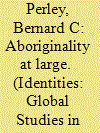

|
|
|
|
|
| Publication |
2006.
|
| Summary/Abstract |
Maliseet is one of many Canadian aboriginal languages that are projected to become extinct within the next twenty years. This article examines the events surrounding Maliseet language instruction that contributed to enactments of resistive strategies that corresponded to varieties of power relations-a process I call aboriginality. The local acts of resistance are situated in the Canadian nation-state ideology of "two founding cultures." I argue the local acts of resistance challenge local asymmetrical power relations while also addressing nation-state ideologies of dominance and coercion. Initially, the focus of resistance was confined to local domains, but over a period of three years, resistive strategies changed to confront global dominance and coercion. I argue the implications of such shifts in strategies and scales of resistance reflect an "aboriginal social imaginary," which holds promise for the survival of aboriginal languages as well as meaningful participation in the "modern social imaginary" called modernity
|
|
|
|
|
|
|
|
|
|
|
|
|
|
|
|
| 3 |
ID:
121109
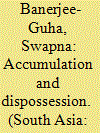

|
|
|
|
|
| Publication |
2013.
|
| Summary/Abstract |
Space and its reconstruction has emerged as one of the foremost devices of capitalist development. In this context, this paper attempts to develop a critique of the prevailing logic of 'development' in India. It argues that the contextual realities of the current exclusionist economic policy in India are defined not only by the nexus of the neo-liberal policy regime and disciplinary political authority, but also by the resistance and struggles of the dispossessed.
|
|
|
|
|
|
|
|
|
|
|
|
|
|
|
|
| 4 |
ID:
173911
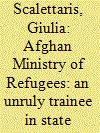

|
|
|
|
|
| Summary/Abstract |
This article looks at the interactions between the officials of the United Nations High Commissioner for Refugees (UNHCR)’s mission in Afghanistan and the heads of the Afghan Ministry of Refugees in the mid-2000s. It examines the rationales that guide officials at both the UNHCR and the ministry, as a way of unpacking the politics of state capacity building in post-2001 Afghanistan. The first section looks at the tense relationship between the two bodies from the point of view of UN officials, who strive to redress a ministry portrayed as ‘incapable’. By looking in turn at the fundaments of the political legitimacy of the Afghan state, at how international intervention transforms the Afghan political arena, and at Afghanistan’s position in global power relations, the following sections identify three rationales that can be ascribed to ministry officials, namely reconciling internal and external state legitimacy, strategic resource tapping and resistance to inter-state hegemony. From its standpoint at the juncture between an ‘external’ and a ‘local’ institution, the article ultimately stresses the importance of gaining epistemological distance from the peace building project in order to consider ‘local’ actors as full political actors.
|
|
|
|
|
|
|
|
|
|
|
|
|
|
|
|
| 5 |
ID:
187288
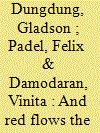

|
|
|
|
|
| Summary/Abstract |
This article documents Adivasi resistance to the ‘loot’ of their land and resources since 1980, especially during the Kalinganagar movement in Odisha, roughly between 2004 and 2010, and the Pathalgadi movement in Jharkhand, between 2016 and 2018. Using the lens of trauma and testimony, the article represents a combined effort by Gladson Dungdung, an Adivasi activist, journalist, and writer who has borne witness to events during these years; Felix Padel, an anthropologist; and Vinita Damodaran, a historian. The land grabs are mainly oriented towards mining and metals production, justified in terms of ‘development’, which leaves many dead and destroys landscapes that Adivasis have cared about for countless generations.
|
|
|
|
|
|
|
|
|
|
|
|
|
|
|
|
| 6 |
ID:
153221
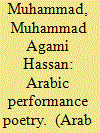

|
|
|
|
|
| Summary/Abstract |
Performance poetry, as a literary term, is known in the Western literature, although some critics may not consider it literary in the first place. This article assumes the applicability of this term to new attempts of some Egyptian youth whose poems share the common features of performance poetry in English literature. Their poetic works are passionate, rhythmic, using aural and visual effects in the background, and dialects in addition to the poet's presentation of the poem face to face with the audience. Regarding the content, their verse has preceded and accompanied the political turmoil Egypt witnessed before, during, and after 25 January Revolution. For this reason, this poetic pattern loudly reflects the concerns, demands, and aspirations of the rebellious generation of youth and the whole Egyptian society. It can be considered the manifestation of the new challenging spirit of the youth in Egypt. The aim of the research is to highlight the similarities between the Anglo-American performance poetry and the literary works of two Egyptian young poets: Hisham al-Gakh and Amr Qatamish. As an interdisciplinary study, literary criticism, cultural criticism including socio-political analysis will be utilized to elucidate how performance poetry represents a new trend of resisting corruption and injustice, as well as a revolution against conventional poetic forms.
|
|
|
|
|
|
|
|
|
|
|
|
|
|
|
|
| 7 |
ID:
101841


|
|
|
|
|
| Publication |
2011.
|
| Summary/Abstract |
This essay argues that many modern discussions of Locke's political theory are unconsciously shaped by an imaginative picture of the world inherited from the past, on which authority and freedom are fundamentally antipathetic. The consequences of this picture may be seen in the distinction made customarily in Locke studies between the 'authoritarian' Locke of Two Tracts on Government, for whom authority descends from God, and the later, 'liberal,' Locke, for whom authority arises from the will and agreement of individuals, and felt in the emphases placed on consent and resistance in most interpretations of Lockean political thought. The essay examines the composition and contours of this picture and, by holding up a mirror to contemporary Locke scholarship, draws attention to some of the ways in which it unwittingly distorts Locke's thinking.
|
|
|
|
|
|
|
|
|
|
|
|
|
|
|
|
| 8 |
ID:
191705
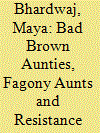

|
|
|
|
|
| Summary/Abstract |
This article offers an urgent complement to the trope of the South Asian aunty as an agent of discipline, shame, heteropatriarchy and tradition by exploring the counter-archetype of the resistance aunty—the radical feminist aunty who holds down social movements—in the South Asian diaspora. This article centres a queer lens on transgressive and activist aunties, and analyses digital and in-person queerings of the aunty in contemporary social and cultural movements. Examining resistance aunties in the writing, performances, interviews and other digital and in-person cultural work of four queer South Asians in the US and the UK, this article asserts the aunty as a core agent of resistance. It develops the notion of the resistance aunty in conversation with activist aunting in Black American organising and scholarship, and locates the legacy of the resistance aunty in queer and trans movements in the Global South and in the diaspora. By applying a new theoretics of resistance auntyhood to studies of aunty labour, this article argues for the importance of queer activist aunties in nurturing and propelling transformative social movements.
|
|
|
|
|
|
|
|
|
|
|
|
|
|
|
|
| 9 |
ID:
160381
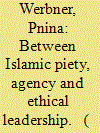

|
|
|
|
|
| Summary/Abstract |
In the face of the huge expansion in the number of women preachers throughout the Muslim world and beyond it, the paper proposes the need to theorise female ethical leadership – the subtle detour that Muslim women have been making to claim rights, including the right to leadership, within Islam, through their extraordinary acts of ascetic self-discipline (askesis). Building on Saba Mahmood’s Politics of Piety, the paper draws further on Foucault’s theory of the ethical subject, particularly in Volume III of The History of Sexuality, to demonstrate that it is women’s everyday asceticism coupled with their scholarly hermeneutical knowledge that is enabling these women to breach the citadel of male Islamic scholarship and leadership. In effect, they are foregoing certain personal freedoms in order to gain power and influence in religious spheres previously closed to them. In this their movement resembles feminist movements in Judaism and Christianity.
|
|
|
|
|
|
|
|
|
|
|
|
|
|
|
|
| 10 |
ID:
119146
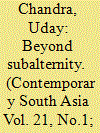

|
|
|
|
|
| Publication |
2013.
|
| Summary/Abstract |
Subalterns, as Ranajit Guha famously argued, resist modern states on the basis of pre-existing social solidarities and an autonomous domain of consciousness. Critics of subaltern studies have argued, however, that subaltern resistance is, in fact, deeply implicated in the symbols and discourses of domination rather than simply constituting an autonomous political domain. Might it be possible to take this criticism of subalternity seriously and yet appreciate the complex ways in which adivasi subjects in contemporary India resist and negotiate their subjecthood? Can we, then, locate resistance in the process of negotiating states? Focusing on the eastern Indian state of Jharkhand, this paper takes up this challenge by probing into the tropes and strategies by which the contradictory mechanisms and meanings of modern state power have been reworked and resisted in two apparently opposed moments of resistance: the 'peaceful' Koel-Karo anti-dam movement of the 1980s and the ongoing 'violent' Maoist movement. In doing so, I show how land and community are intertwined inextricably in recent adivasi resistance such that the notion of 'community' underpins both territorial claims on the post-colonial state by Munda men and women and efforts to remake political selves in dialogue with statist discourses of primitivism.
|
|
|
|
|
|
|
|
|
|
|
|
|
|
|
|
| 11 |
ID:
171303
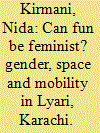

|
|
|
|
|
| Summary/Abstract |
The densely populated, multi-ethnic area of Lyari in Karachi is one of the city’s original settlements. The area has become infamous as the site of an ongoing conflict between criminal gangs, political parties and law enforcement agencies for over a decade, and, for this reason, Lyari has been labelled as one of several ‘no-go areas’ in the city. However, for the residents of Lyari, the ways in which they understand their part of the city far exceed these facile labels. While at times their neighbourhoods do become fearful spaces, they are also places of comfort, familiarity and fun. This article explores the multiple ways in which women and girls experience and understand this area. In particular, it documents the various ways in which they express and experience enjoyment in their everyday lives and during exceptional moments. Based on extensive interviews and participant observation in several neighbourhoods, the research shifts attention away from solely using violence as a lens to understand urban space and away from seeing women mainly as victims of violence. Focusing on the pursuit of fun and enjoyment as an area of academic inquiry can be an important way to show how women push against and challenge patriarchal boundaries. By highlighting women’s and girls’ own creative navigations and engagements with their locality and the city, this paper brings new insights into discussions of gender and urban marginalisation more generally.
|
|
|
|
|
|
|
|
|
|
|
|
|
|
|
|
| 12 |
ID:
114576
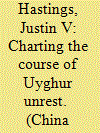

|
|
|
|
|
| Publication |
2012.
|
| Summary/Abstract |
What explains the course of Uyghur-related violence in Xinjiang and Central Asia since 1990? Using data derived from a variety of sources, I argue that the locations and types of violent incidents were influenced by a combination of Chinese government policies and the political geography of Xinjiang. Specifically, 1990 to 1996 were dominated by logistically complex incidents in a low-level violent campaign in Xinjiang. The Strike Hard campaign in 1996 brought about an increase in logistically simple incidents in Xinjiang and some violence in Central Asia as Uyghur separatists had trouble moving people, information and weapons across the well-guarded, difficult terrain of Xinjiang's borders. China's rapprochement with Central Asian countries in the late 1990s led after 2001 to a dramatic decrease in Uyghur-related violence in general, but also signalled the appearance of logistically creative attacks that required little planning or materials. My findings suggest that Uyghur rebels will have a difficult time mounting a large-scale violent campaign as long as China retains even minimal control of Xinjiang.
|
|
|
|
|
|
|
|
|
|
|
|
|
|
|
|
| 13 |
ID:
158083
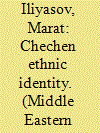

|
|
|
|
|
| Summary/Abstract |
This article critically assesses the ostensible transformation in Chechen ethnic identity. Journalists and scholars who came to this conclusion based their claim on obvious changes in Chechen behavior. The brave and irreconcilable resistance the nation demonstrated during the First and the Second Russo-Chechen Wars of 1994–1996 and 1999–2009, respectively, was replaced by a submissive and loyal stance with regard to the new authorities and recent enemies. This article investigates whether such a change in behavior reflects a corresponding change in ethnic identity. This article asserts that ‘non-Chechen’ behavioral models do not signify changes in Chechen ethnic identity by presenting and analyzing Chechen narratives concerning the question. In summary, this article concludes that the ethnic identity of the nation remained mainly untouched. This conclusion is supported by the observed continuity of Chechen resistance, which has always been driven by cherished values such as freedom.
|
|
|
|
|
|
|
|
|
|
|
|
|
|
|
|
| 14 |
ID:
119950


|
|
|
|
|
| Publication |
2013.
|
| Summary/Abstract |
This article considers the figure of the clown-fool as a way of approaching anew contemporary practices of sovereignty and resistance. The spectre of the camp as the nomos of modern sovereign power is widely critiqued for its neglect of the thriving and teeming life that actually accompanies the declaration of exception. The clown is an errant and troublesome figure whose life haunts the sovereign decision on exception. His presence in border-camp activism invokes a rich, provocative history in which the clown's foolish wisdom has critiqued the conceits of power. Yet, the clown's significance exceeds his traditional associations with carnivalesque misrule and mockery. Like homo sacer, the clown occupies an ambiguous position between political inclusion and exclusion, between inside and outside. In short, the sovereign needs the clown. His relation to resistance is thus also complex. The clown does not turn to face a locus of power as though it could be countered or overturned. Rather, he is the example par excellence of the resistance always already present within the exercise of power: standing not inside or outside the gates, but looking through, he dwells within the court but is not of its making. As a singularity akin to Deleuze's figurative children and Agamben's tricksters, the clown troubles the division between interior and exterior on which sovereign political life rests, a division that is also frequently replicated in understandings of resistance.
|
|
|
|
|
|
|
|
|
|
|
|
|
|
|
|
| 15 |
ID:
167415
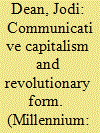

|
|
|
|
|
| Summary/Abstract |
This essay considers the political form that is presupposed in questions of resistance and revolution. It situates resistance and revolution in communicative capitalism, a setting characterised by intense winner-take-all inequality, the decline of symbolic efficiency, and the shift from the use to the circulation value of communicative utterances. It draws out the way that this setting inflects the body the question of resistance and revolution presupposes. Is it the world, the individual, the network, or the party? I argue that the party is the form we need to assume when we ask about revolution because it is the party that has the capacity to strategise, to plan and to arrange itself with an eye to revolution.
|
|
|
|
|
|
|
|
|
|
|
|
|
|
|
|
| 16 |
ID:
099905
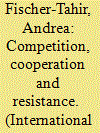

|
|
|
|
|
| Publication |
2010.
|
| Summary/Abstract |
After the fall of Saddam Hussein's regime in April 2003 many women supported the process of transition and became active in political parties and coalitions. A wide range of groups were also formed which pursued women's rights agendas and, in many cases, included a call for peace and reconciliation and charity activities for women and children. However, female political action and the field of women's rights remain divided by the same multiple boundaries of belonging which affect Iraqi society itself; women operate in specific ethnic and denominational, local and regional settings, and they support nationalist, secularist, left-wing or Islamist agendas. Women's rights-whatever the direction-can be of major or minor concern.
This article outlines female political action and draws attention to the key issues which are discussed, in particular, by secular feminists in Iraq. In so doing, the article highlights how women in Iraq have not only lost, as a wide range of observers argue, but have also benefited from the restructure of the political landscape. Female political activists are still faced with old and new social, cultural, legal and political obstacles. The article argues that when women support narratives that leave men's superiority untouched, they are not simply victims of men or 'false consciousness'; women either compete and cooperate, or they reject ideological narratives and power relations, while pursuing agendas of individual interest. Yet, despite competition among women and women's groups, and women's loyalty to agendas controlled by men, radical overtones that resist male domination can be heard- and should be supported.
|
|
|
|
|
|
|
|
|
|
|
|
|
|
|
|
| 17 |
ID:
097891
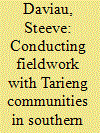

|
|
|
|
|
| Publication |
2010.
|
| Summary/Abstract |
Based on research with ethnic minorities in Laos aimed at understanding how they cope with and negotiate political and economic 'double domination', this article examines the experiences of prolonged fieldwork in a remote Tarieng area in the Annam Range, southern Laos. After briefly reviewing Lao ethnographical policy and practice regarding ethnic minorities, I introduce the Tarieng people. I detail how I initially gained access to these local communities via long-term engagement with a range of development project initiatives. Then, after eight years of conducting such fieldwork in a Tarieng area 'below the radar of the state', I managed to obtain official authorisations to continue research as a graduate student. In this new position, I accessed the field via different negotiations with central, provincial and local official bureaucracies. After detailing this process, back in the field I reveal my strategies to create a discursive space that has allowed me to access dissident Tarieng voices and agency. Finally, I highlight four central elements that have continued to shape my field research: language proficiency, working with research assistants, awareness of political relations and cultural sensitivity, and ethical concerns. These have emerged while the possibilities and constraints of political engagement with the Tarieng people are explored.
|
|
|
|
|
|
|
|
|
|
|
|
|
|
|
|
| 18 |
ID:
159221
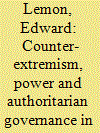

|
|
|
|
|
| Summary/Abstract |
Counter-extremism has become an important tool for the authoritarian government of Tajikistan to consolidate its position. In this article, we argue that counter-extremism is not purely about destructive acts, such as banning groups or arresting individuals: it is productive, too. Using a Foucauldian understanding of disciplinary power and biopower, we argue that counter-extremism in Tajikistan is an attempt to produce secular, docile citizen subjects who are resistant to extremist ideas. Using ethnography and discourse analysis, we focus on the way in which these practices are gendered, targeting the bodies of those deemed ‘dangerous’. Counter-extremism, we argue, is exercised not only by the state but also by citizens, who monitor themselves and others for signs of radicalization. Although some support state secularism, most merely accept it. A smaller group resist practices that target certain forms of religious belief and practice. We explore these everyday forms of resistance against disciplinary power and biopower.
|
|
|
|
|
|
|
|
|
|
|
|
|
|
|
|
| 19 |
ID:
120000
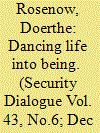

|
|
|
|
|
| Publication |
2013.
|
| Summary/Abstract |
A variety of scholars in critical security studies have recently argued that new modes of neoliberal world order are influenced by the emergence of complexity theory in the sciences, which manifests itself, for example, in the discourse of resilience. By contrast, this article aims to point at the number of governmental discourses and practices in which 'old' understandings of order are persistent. What will be argued is that such a set of practices can be found in the regulation of genetically modified organisms (GMOs), in which the dominant approaches and strategies still rely on an understanding of life that is bound to a more traditional episteme that expresses the desire for predictable management with clearly controllable effects. The article then moves on to discourses of resilience to show how they are equally characterized by this episteme. In unravelling the struggle that exists between 'old' and 'new' epistemes, the article aims to elaborate on the potential of complexity discourses for challenging particular governmental rationales, manifested in both the resilience context and the GMO controversy.
|
|
|
|
|
|
|
|
|
|
|
|
|
|
|
|
| 20 |
ID:
188584
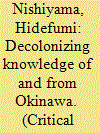

|
|
|
|
|
| Summary/Abstract |
This paper explores the militarized situation of Okinawa Island and the ongoing struggles and challenges that Okinawans continue to confront. Particular focus is placed on how Okinawans challenge dominant colonial forms of knowledge, which assert that the U.S. military presence on the island is beneficial for Okinawan and Japanese people. After contextualizing Okinawa Island within contemporary American imperial geopolitics and outlining the current state of the island, the paper looks at three different, yet closely integrated, ways in which Okinawans, led by activists and progressive local officials, challenge the dominant narrative on the U.S. military. By questioning dominant assumptions about security, a base-dependent economy, and Okinawans’ indigenous status, these movements contribute to the decolonization of knowledge, an important step toward the demilitarization of the island. The paper concludes with a discussion of remaining challenges for decolonial knowledge production.
|
|
|
|
|
|
|
|
|
|
|
|
|
|
|
|
|
|
|
|
|